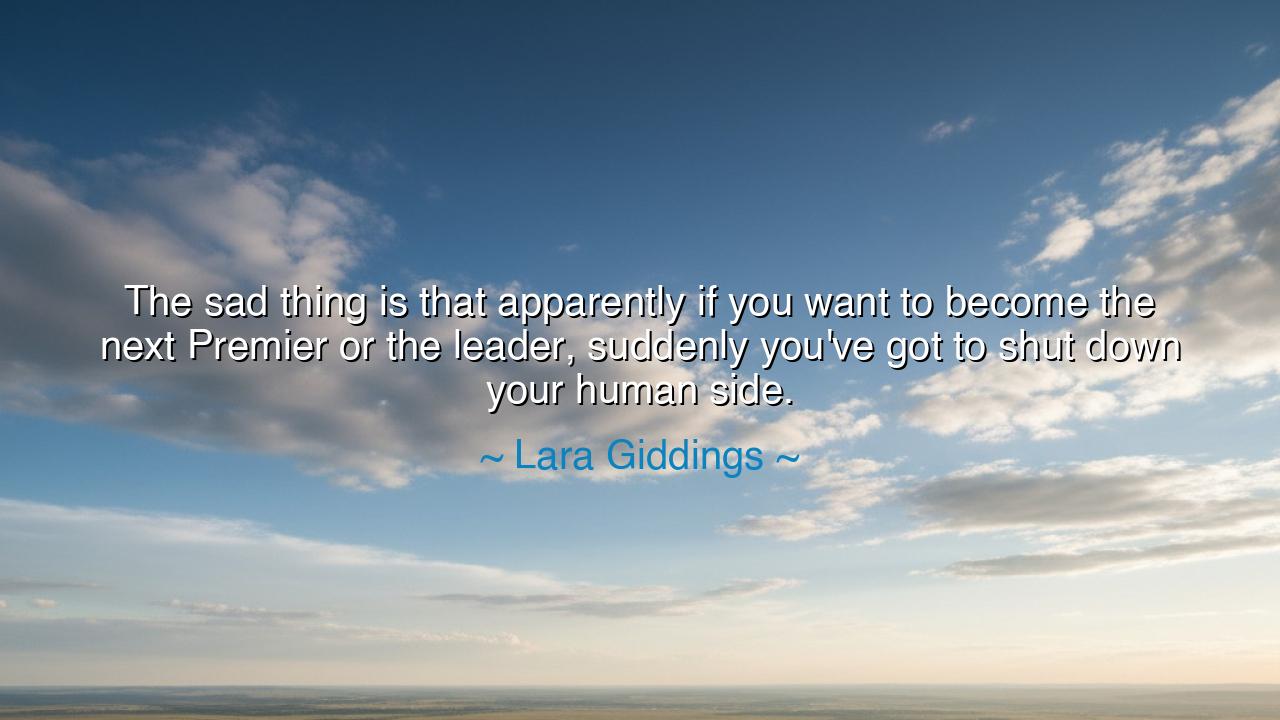
The sad thing is that apparently if you want to become the next
The sad thing is that apparently if you want to become the next Premier or the leader, suddenly you've got to shut down your human side.






Lara Giddings, a leader who walked the difficult path of politics, once spoke with piercing honesty: “The sad thing is that apparently if you want to become the next Premier or the leader, suddenly you’ve got to shut down your human side.” In these words lies a lament as old as governance itself—that those who aspire to rule are too often asked to silence their tenderness, their doubts, their compassion, and to wear instead a mask of invulnerability. To lead, in the eyes of the world, is to seem unshaken, unfeeling, and unbreakable. Yet the tragedy is clear: a leader who shuts down the human side loses touch with the very people they are meant to serve.
The origin of this struggle is rooted deep in the history of power. From the days of emperors and kings, rulers were expected to stand above their people, cloaked in majesty, hidden behind ceremony and distance. Weakness was forbidden, for weakness invited rivals; vulnerability was dangerous, for it could be exploited. Thus, even in our modern age, leaders often feel compelled to suppress their humanity to survive the trials of ambition. Giddings gives voice to the sorrow of this reality: to rise in the eyes of the people, one must often sacrifice the most vital part of being human.
History offers us countless examples. Consider Marcus Aurelius, emperor of Rome. Though his Meditations reveal the soul of a philosopher—gentle, reflective, deeply human—his public life demanded the stoic mask of authority. To his armies and his people, he had to be unwavering. Yet in the solitude of his writings, he confessed his fatigue, his grief, and his yearning for simplicity. Marcus shows us the dual life of a leader: outwardly armored, inwardly human. His greatness lay in never entirely losing that inner self, though many rulers after him did.
By contrast, think of Richard Nixon, who, in his hunger for power, allowed suspicion and calculation to consume him. The human side—the capacity for openness and humility—was buried beneath the ruthless desire to remain in control. His downfall was not merely political, but spiritual: a man who lost touch with compassion, trust, and transparency. In him, Giddings’s warning comes alive: when leaders shut down their human side, they may rise for a time, but they fall with devastation.
The deeper meaning of Giddings’s words is that leadership should never demand the death of humanity. For what is leadership if not the art of guiding souls? A leader without humanity becomes a machine—efficient, perhaps, but cold, detached, and incapable of true service. The greatest leaders have always been those who allowed their human side to shine through their authority: Abraham Lincoln, with his melancholy compassion; Nelson Mandela, with his forgiveness after years of suffering; Jacinda Ardern, with her tenderness in times of national grief. These leaders prove that power and humanity need not be enemies.
The lesson for us is this: if you are called to lead—whether in a family, a community, or a nation—guard your human side as your most precious treasure. Do not let ambition steal your compassion. Do not let appearances strip you of authenticity. For the people you lead do not need a mask; they need a soul. They need a heart that can weep with them in sorrow, rejoice with them in triumph, and guide them not from cold calculation, but from love.
Practical wisdom follows: in your daily life, practice leadership by practicing humanity. Listen with sincerity. Admit when you are wrong. Show kindness even when it costs you. And if you rise to positions of authority, remember that strength is not the absence of feeling, but the ability to act with courage while still feeling deeply. In this way, you will prove Giddings’s lament wrong—you will be both a leader and a human, and in that union lies the hope of true greatness.
Thus Lara Giddings’s words remain both sorrow and warning: leadership that kills humanity is a hollow crown. Let us, therefore, seek leaders—and strive ourselves to be leaders—who carry authority not as a mask but as a mantle, worn with honesty, compassion, and courage. For the world does not need more rulers who are cold and untouchable; it needs leaders whose human side is their greatest strength.






AAdministratorAdministrator
Welcome, honored guests. Please leave a comment, we will respond soon